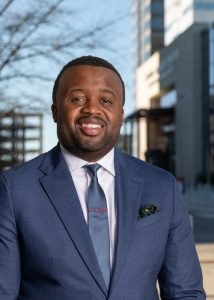Over the years, equity has become a hot topic amongst nonprofit organizations, but what is equity? No matter what industry or cause an organization supports, equity should be at the forefront and a driving force of how an organization operates.
In this edition of The Conversation, CFGG’s Vice President of Operations and Equity, Michael Humphrey, highlights how CFGG implements equity philanthropy.
————————————————————————————
1. What does philanthropy mean to you?
Philanthropy to me is giving, caring, and playing an active role in the well-being of a community. It is defined as the desire to promote the welfare of others, expressed especially by the generous donation of money to good causes. Whether defined by me or by Merrian Webster, at its core philanthropy represents the good that can be attained for a community. The question for me came because I didn’t feel that philanthropy was a realm in which I could dwell as a person of color. My perception of philanthropy was that it was all ‘brick-and-mortar’ fundraising, reserved for very wealthy white people. I saw philanthropy as something that only families with names like Carnegie and Rockefeller, need bother with…and I could not have been more wrong, because I too am a philanthropist. While those wealthy American families utilized their wealth to help communities by building hospitals, colleges and universities, businesses, etc., that bear their names, it was their giving that directly impacted people, and that carries further with me.
It was not until my introduction to the Community Foundation of Greater Greensboro that I realized that philanthropy was within my reach, without being either wealthy or white. On the contrary, I am a Black man who isn’t wealthy, but as a native of Greensboro, I desire to witness, nurture, live, and create a better life in Greensboro for myself, my family and all citizens of this great city. I never imagined moving back to Greensboro, after nearly 25 years aways, and to be able to invoke change, and leverage my position as a platform to teach others about philanthropy is beyond my wildest dreams. This is also an opportunity to utilize various tools of philanthropy to not only raise money for important causes such as housing, workforce, and education, but to also see how it can be used to manifest change in public policy and give voice to issues of social justice. Philanthropy to me means greater opportunities for all.
2. What is CFGG’s role and responsibility in fostering diversity and equity?
The Community Foundation of Greater Greensboro bears the responsibility of servicing a community that is majority-minority, with a population that is approximately 52% ethnic minority and 48% white. So, when it states that CFGG’s vision is a city where people work together to enrich the lives of all, there is an expectation of CFGG to look representative of the community in its staff and Board of Directors, and for CFGG’s work to benefit everyone. We work hard to be an organization with diverse leadership, inclusiveness in our partnerships and with our volunteers, and equitable throughout all our work and various initiatives. The theme and principles of equity are infused throughout all aspects of our work.
We have incorporated a ‘Diversity, Equity, and Inclusion Statement’ which reads:
“Our communities are diverse. They include people of all ages and abilities, creeds and religions, cultures, ethnicities, gender identities, national origins, and socioeconomic backgrounds. To pursue our mission, we will embrace our diversity, create opportunities for equity, commit us to fairness, and promote inclusion of all people.”
3. How can CFGG leverage partnerships to have a greater impact?
The Community Foundation of Greater Greensboro must use collaborative partnerships to achieve our vision of our city as a welcoming and thriving place where people work together to enrich the lives of all. The operative term in our vision is ‘enrich the lives of all’, not just some, but all! Through our role as fundraisers and granters, we can create financial resources to grant to local non-profits and help to finance the work of other organizations that do more of the programmatic grassroots work. We not only raise funds, but we also serve as convenors, pulling together key community stakeholders including local politicians, business leaders, civic and community leaders, and Greensboro residents, to create opportunities for all residents of Greensboro.
4. How does CFGG’s mission and values align with the needs of the community?
The mission of CFGG states: “The Community Foundation of Greater Greensboro inspires giving, maximizes opportunities and strengthens communities for every resident.” Greensboro, like many cities across the country, has its great points but faces some challenges as well. With an initiative like Guilford Jobs 2030, we are working to tackle one of those challenges. The challenge is a local workforce not adequately trained to fill skilled roles that are available now, and even more to come. Our goal here is to reach 60% of the local workforce being adequately trained/certified to fill these roles by 2030. There is a local affordable housing shortage that we are addressing with the creation of a housing fund used to fund builders in this type of development. We are also working to nurture and further develop local entrepreneurs, especially considering that most of the employers in Greensboro are entrepreneurs. This entrepreneurial sector must get our continued support.
The CFGG values include: Diverse and inclusive leadership, Strong entrepreneurial spirit, and Access to meaningful opportunities for every resident. I’ve talked a bit about CFGG’s diversity in leadership, and it is fact that diverse groups have proven more creative than groups of people with no diversity. It’s important that Greensboro and CFGG both remain creative and innovative entities. Likewise, a strong entrepreneurial spirit is needed both internally and externally as we go about our work in and around the Triad region. And finally, communities can’t thrive in a disparity-filled have and have-not environment. People generally are not looking for a hand-out, but more-so a hand-up and that is the definition of equity itself. It’s leveling the playing field, so that all can play in this game called life, and its truly organizations like CFGG and so many others that must figure how to invest in Main Street versus Wall Street. Philanthropy to me is about people and what vehicles can be used to enhance the lives of all citizens alike.


